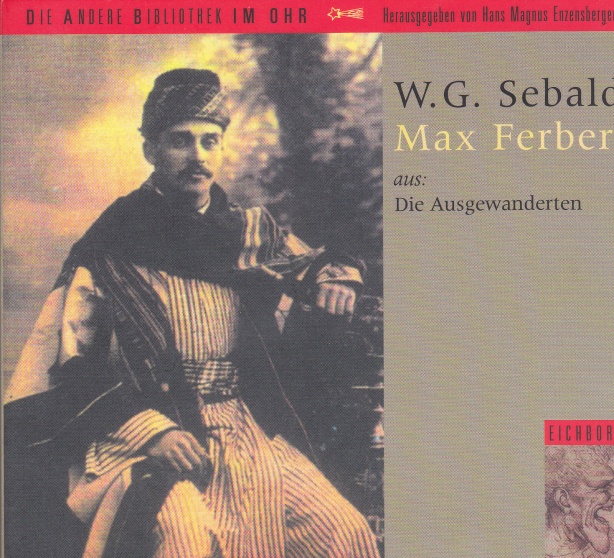Sebald Audio Books
I thought it might worthwhile to do a roundup of the W.G. Sebald audio books available as of today, August 2018. The first six of the titles below are available for individual purchase (as downloads) via Audible, either individually or through an Audible subscription. Click here to see Sebald’s titles on Audible, where sample sections may be heard. Three of these titles are also available for download purchase at Audiobookstore.com, where the prices are somewhat cheaper. Sample sections can be heard here, too. All English-language titles are available for download at iTunes—along with several podcasts in English & German about Sebald).
Ω
English-language audio books.

Austerlitz. Narrator: Richard Matthews. (Audible, Audiobookstore.com & iTunes)

The Emigrants. Narrator: Mel Foster. (Audible, Audiobookstore.com & iTunes)

The Emigrants: Ambros Adelwarth (Edward Kemp radio play adaptation). (Audible & iTunes) This adaptation of the third section of The Emigrants was originally broadcast on BBC Radio 3, starring John Wood, Henry Goodman, Eleanor Bron, Ed Bishop, Margaret Robertson, Andrew Sachs, Cosmo Solomon, Thomas Arnold, Jasmine Hyde and Maximilian Graber. Music by Gary Yershon. Directed by Edward Kemp. Warning! The Amazon page for this title is very misleading. Only the Audible Audiobook link genuinely leads you to the Kemp radio play. All of the other links (Kindle, Hardcover, Paperback & MP3) actually take you to versions of Sebald’s The Emigrants.

On the Natural History of Destruction. Narrator: Simon Vance. (Audible, Audiobookstore.com & iTunes)

Rings of Saturn. Dinau Mengestu, Rick Moody, Hari Kunzru, Denis O’Hare. Although it is announced at the start of this recording that actor Denis O’Hare will begin by reading an excerpt from Sebald’s book, this is not part of the audiobook, probably due to copyright reasons. So this audiobook consists of the three writers having a conversation about Sebald’s book and answering audience questions. This seems to be part of something called Thalia’s Book Club, which is geared to “avid readers ages 9-14” sponsored by New York’s Symphony Space. (Audible & iTunes) (You can also listen to this on SoundCloud.)
Ω
German-language audio books.

Austerlitz. Narrator: Michael Krüger. This is an 9 CD audiobook of the original German text. Locations for purchasing a CD or download can be seen at the German website for Random House audio books. (iTunes) Even thought this runs more than 11 hours long, it is only $19.95 on iTunes and €22.95 at buecher.de.

Die Ausgewanderten. Narrator: Paul Herwig. This is a 7 CD audio book of the original German text for The Emigrants. €20.00. Available at the Winter & Winter website.





